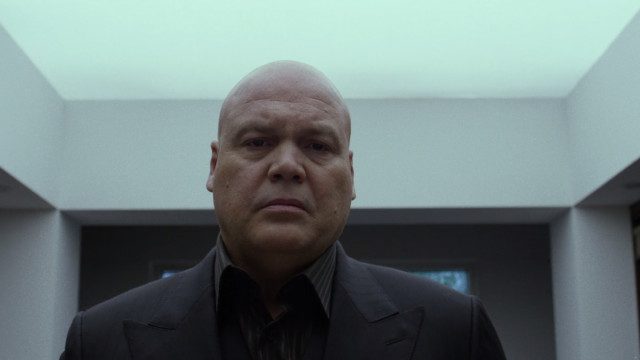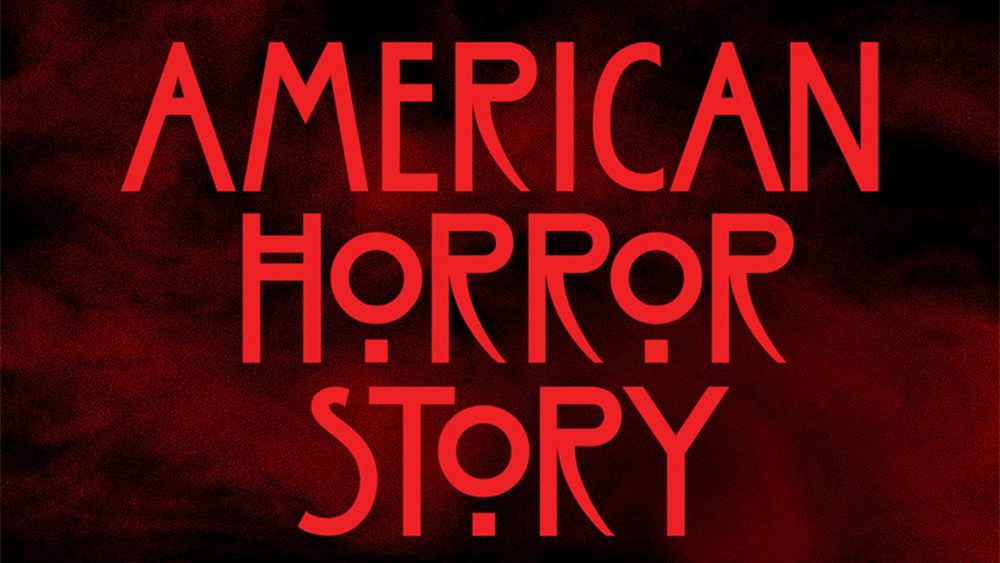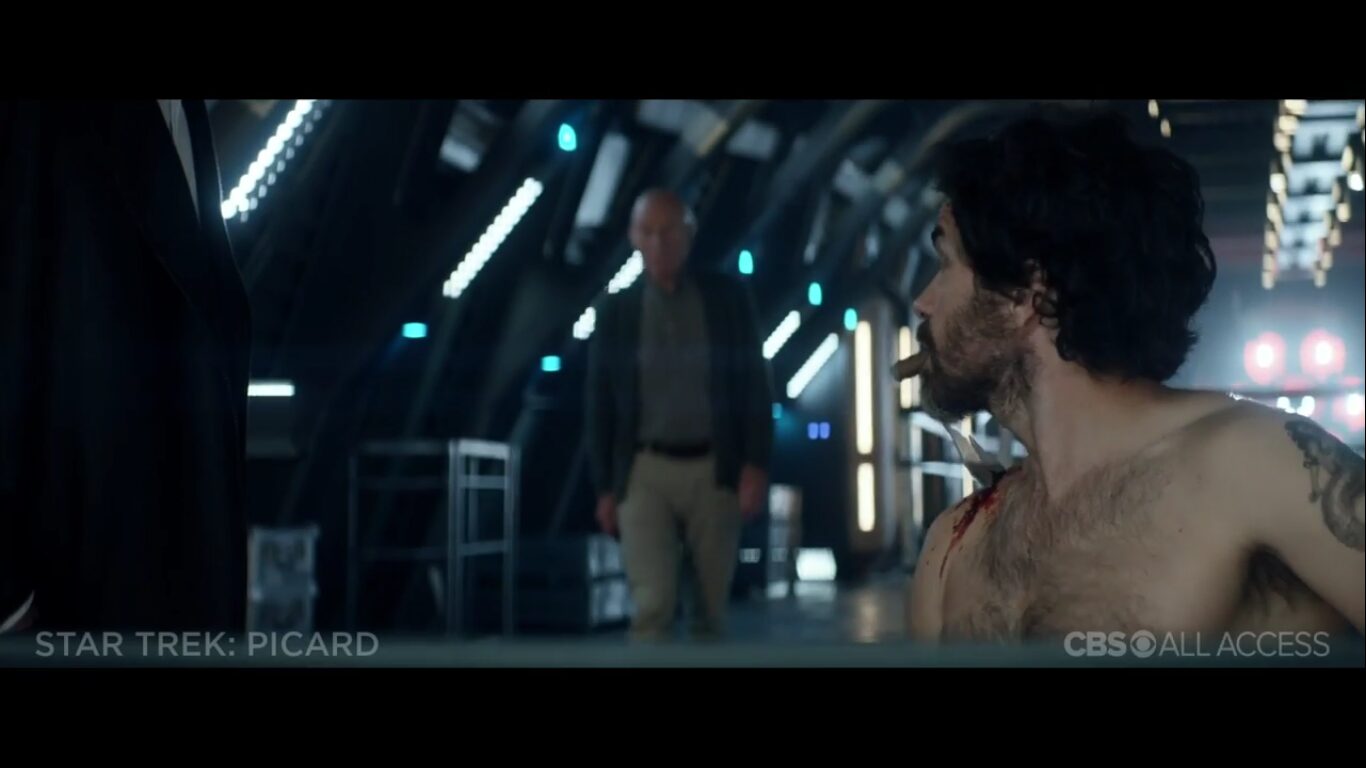On the heels of “Stick,” which acted as an origin story for Matt Murdock, Daredevil gives us “Shadows in the Glass,” which acts as an origin story for Wilson Fisk, and Jesus Christ is this a dark episode. Appropriately dark, don’t get me wrong, and fittingly so for a character like Fisk, who is quickly becoming one of the most complex villains in the Marvel cinematic universe.
We see Fisk go through his daily routine: wake up in a panic, cook an omelette while classical music plays (in sequences clearly inspired by Hannibal), choose an outfit from an array of nearly identical dark suits, catch a reflection in the mirror of his younger self, covered in blood, and – wait, what? Oh, right, Wilson Fisk is a seriously damaged individual, and after getting a glimpse at his upbringing, it’s not hard to understand why.
Fisk’s father Bill (Dominick Lombardozzi, of The Wire and Boardwalk Empire) is your classic Hell’s Kitchen blue collar asshole. He calls his son a pussy, but won’t let him settle into that role. When Wilson is beat up by a bully, Bill takes his son with him to go confront the kid. He shoves him against a fence and beats him onto the ground, before ordering Wilson to kick him. “Kick him! Kick him harder!” It’s a deeply unsettling scene, and Lombardozzi nails what little screen time he has in “Shadows.” His squat, compact physique looks full to bursting with rage and unfulfilled dreams, and he passes that anger and insecurity onto his son.
That brings me to my next point about Wilson Fisk, which might be my favorite aspect of this character. He’s a man who purposely isolates himself, and forbids others from speaking his name, yet he seems to yearn for human contact. He flinches when Madame Gao takes him to task for his sloppy operation, just minutes after almost sheepishly asking Wesley if he can be present for the meeting with Gao (Wesley, ever the loyal friend, says that he’s already on his way). Vincent D’Onofrio’s halting, almost apologetic manner of speaking does little to belie what pain Wilson Fisk is truly capable of inflicting. He’s a man who seems uncomfortable in his own skin, and I think it’s safe to say that Daredevil has given us our first neurotic supervillain.
The blood-splattered version of young Wilson is explained too, in graphic and disturbing fashion. While being made to sit and stare at a wall – the splotchy paint job is clearly evocative of the painting Fisk bought from Vanessa – Wilson hears his father beating his mother, to the point that he has no choice but to strike his father again and again with a hammer, screaming and sobbing. Just when you think things can’t get any darker, his mother turns to him and says, “Get the saw.” Seriously, episode nine better have a musical number in it for how dark this installment is.
Not to repeat the old cliche, but there’s really not that much difference between Fisk and Daredevil. They both want to help the city, they both work in secrecy, and they were both reared – trained, if you will – by near-fascistic father figures, whose ideals they rejected as a way of forming their own identities. Fisk wears his father’s cuff links every day as a reminder that he’s not cruel for the sake of being cruel. (Daredevil, for his part, is still using the billy clubs that Stick gave him.)
“Shadows in the Glass” is the kind of episode I would point to if someone asked me why Daredevil should be on Netflix. Without having to account for commercial breaks, or a feature-length run time, the show is able to really dig into every member of its cast, and D’Onofrio’s formidable, tour de force performance makes this one of the best episodes of Daredevil‘s first season. Wilson Fisk may be the bad guy, but I find myself having trouble hating him, because D’Onofrio doesn’t, and more importantly, the show doesn’t.
A Few Thoughts
- I talked a lot about Fisk in this review (duh) and glossed over the Matt/Karen/Foggy/Ben investigation. I’m glad Matt’s on board, and I’m more interested in this subplot now that it’s dovetailed with the main story
-
“That’s lawyer-talk for stupid”
-
“Your rules suck! I want that on record”
-
Fisk seems like the devil himself when he asks Hoffman how much his years of friendship with Blake are worth, “in a round figure.” Daryl Edwards, as Hoffman, does some great facial acting here
-
Leland Owlsley is seen getting fitted for a green coat, much like his comic book alter ego The Owl wears
-
I’m working with this theory that Daredevil is positing Fisk as some kind of mythic boogeyman. The more people talk about him, the more real he becomes. In the first episode, no one would say his name and he was only heard as a voice on a telephone. Now people are saying his name all over town – Madame Gao even calls him “Wilson” – to the point that the entire episode pretty much revolves around him. It’s basically the same logic as Bloody Mary or Candyman
-
My favorite line, and favorite delivery: Fisk roaring at Vanessa “I’m not a monster!” before switching tones and adding “Am I?”




